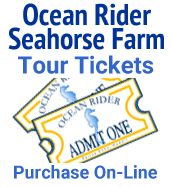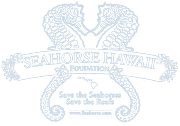Ocean Rider Seahorse Farm and Tours | Kona Hawaii › Forums › Seahorse Life and Care › First Seahorse(s)
- This topic has 2 replies, 2 voices, and was last updated 15 years, 11 months ago by Poor2day.
-
AuthorPosts
-
August 9, 2008 at 10:15 am #1519Poor2dayMember
:blink: Hi, new to the site, found it after traversing the myriads of pages you get now a days when you Google or Yahoo anything. I am ready to purchase my first \"Ponies\", I\’ve looked at most of what is on the site but can\’t find a scientific name for what you refer to as \"Mustangs\", can you help?
My current thoughts for first horses are Kudas, Erectus or Reidi, any thoughts?Thanks[color=#0000FF][/color]
August 10, 2008 at 2:27 am #4391Pete GiwojnaGuestDear hobbyist:
Mustangs are a highly domesticated strain of captive-bred-and-raised Hippocampus erectus that are very well adapted for aquarium conditions. They are large, robust, hardy seahorses that are well suited for beginners. They would be an excellent choice for your first seahorses, particularly if you are interested in breeding your seahorses and attempting to raise the babies. Home hobbyists find H. erectus much easier to rear than the other two species you are considering (H. reidi and H. kuda).
Unfortunately, Hippocampus reidi and H. kuda are both considered to be among the most difficult seahorses to raise on a consistent basis because their fry are small and often need to be started on rotifers or copepods for their first food, and because both species go through an extended pelagic phase of development during which mortalities are typically very high. So if you want to raise any of the seahorses you’ll be keeping, H. erectus is probably the best choice for you.
On the other hand, if you just want colorful seahorses that you can enjoy in your aquarium, the bright yellow, orange, or red color phases of H. reidi would be hard to beat. Many aquarists consider them to be the most beautiful of all the seahorses. Because they are difficult to raise, they have not been captive bred and raised for as many generations as H. erectus, and are therefore not quite as hardy in the aquarium, but if you’re looking for brightly colored seahorses and you’re not interested in raising the babies, they are probably your best bet.
Hippocampus kuda would be my last choice of the three species. They are not especially hardy, difficult to raise, and not particularly colorful.
Regardless of the species you decide is best suited for your needs and interests, the best thing you can do to increase your chances of success is to avoid wild-caught seahorses at all costs and stick with domesticated seahorses. You will find captive-bred-and-raised seahorses to be much hardier, easier to feed, quicker to breed, and more convenient to care for than seahorses that have been removed from the wild. You will also want to obtain your cultured seahorses directly from the breeder, rather than getting them from a retail outlet or going through any sort of middlemen.
If you contact me off list ([email protected]), I can provide you with more detailed information on each of these species to help you decide which of them you might like to try. And once you settle on the type of seahorses you would like to work with, I can provide you with lots of useful information for optimizing your aquarium to meet their needs.
In the meantime, you can search the forum for any information in which you have an interest. There is a rectangular window in the upper right-hand corner (just above the page numbers) on the forum with the words "search forum" in it. Just type the word or phrase you are looking for into that window and press "Enter" on your keyboard, and the results of your search will pop up in just a few moments. For example, if you type in "feeding tips" or "breeding" or "newbie," it will direct you to a list of discussions on those topics. The best way to get started is to do your homework ahead of time and find out as much as you can about the care and keeping of seahorses before you take the plunge.
Best wishes with all your fishes!
Happy Trails!
Pete GiwojnaAugust 10, 2008 at 5:01 am #4393Poor2dayGuestPete,
Thank you for the information. -
AuthorPosts
- You must be logged in to reply to this topic.





